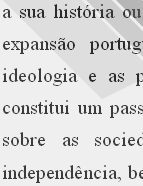

................................
Understanding the need to become familiar with the colonised populations in order to better dominate them, in other words, transforming anthropological knowledge into one of the central pillars of colonisation, was a task to be developed in the First Republic. In this context, in addition to important institutions, such as the Agência Geral do Ultramar [General Agency for Overseas Territories] (AGU), in 1924, directed in the early years by Armando Cortesão, two leading figures emerged in the attempt to shift the colonial paradigm, whether by actions, texts, or a new vision of the populations: Norton de Mattos and Ferreira Diniz. However, they were not endorsed by the scientific community and much less by the administrative leaders of the colonies, mainly concerned with the creation of conditions for the development of a white colonisation, as would be revealed by the studies presented at the Congresso de Medicina Tropical da África Ocidental [Congress on Tropical Medicine in West Africa], organised in 1923.
The rejection of a colonial project guided for and by knowledge was to hinder any attempt to organise a Portuguese scientific discourse, and was reinforced within the framework of the Portuguese political changes defined from 1926 onwards: scientific research, study, higher education and knowledge production related to the colonial issue fell definitively under the control of the State, as did the organisation of events of a recreational-formative nature such as Exhibitions, or of a scientific nature such as Congresses and research missions.
In 1934, both the Exposição Colonial do Porto [Oporto Colonial Exhibition] and the 1º Congresso Nacional de Antropologia Colonial [1st National Colonial Anthropology Congress] were, above all, sites for the dissemination of the colonial ideology that guided the fabrication of 'scientific' knowledge, centred around enhancing the Portuguese race and civilising action, which was reinforced by research in the field of physical anthropology (Mendes Corrêa, As Raças do Império [The Races of the Empire], 1943).
